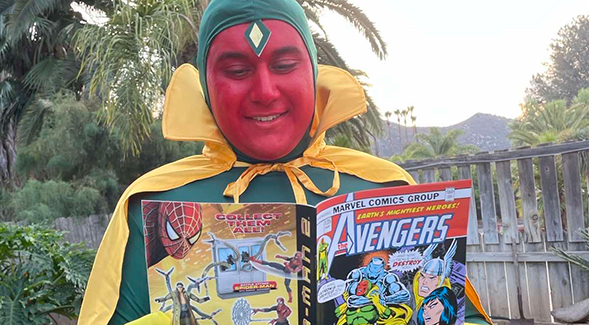New Student Club Creates Community Through Comics
Fawaz Qashat, president of the Comics Studies Club, is participating in a Comics@SDSU panel at this year's San Diego Comic-Con International.

Biology student Fawaz Qashat found comfort in comics when he moved to the U.S. from Iraq in 2009. He immersed himself in Marvel’s X-Men, Fantastic Four, and later the Scarlet Witch to better understand the world around him.
“I was an immigrant and it was tough to fit in and learn the language,” Qashat said.
The connection and community he yearned for appeared in a general education course he chose on a whim. In the Comics and History (HIST-157) class taught by Elizabeth Pollard, history professor and co-founder of Comics@SDSU, he felt a certain kinship with Pollard and the other students.
“It was my first semester coming into college, and I was very nervous. It was all online (due to the pandemic), and that class really helped me find a sense of community and togetherness,” Qashat said.
His interest in learning more about how comics can be critically analyzed and applied to everyday life was sparked, in what he calls that “awe-inspiring” class, to further stoke his passion for comics.
“When I was younger, I really didn’t understand comics,” he said. After taking the course, he was able to see the deeper messages in the characters and stories he read.
One area that stood out in the coursework was graphic medicine.
“It bridges the gap between learning about the processes of the human body with images and text to tie it all together,” Qashat said. “In a regular textbook, you are learning about all these complex systems like the circulatory and respiratory systems, but when you put it into graphic medicine and you put it into a comic, you see all those things working together in union. Which is just amazing. For me a textbook was never able to do that.”
He volunteered and was paid, through a student success fee, to do research for the Comics@SDSU interdisciplinary initiative along with students, Luke Heine and Julia Ross. The three formed the new SDSU Comics Studies Club to inspire and share the comics genre and cast a wider net for all students at SDSU.
The club offers a space where students can dive into big topics like social justice, identity, public health, mental health, and disability in comics. “We are also exploring something new called hero therapy — where you focus on one super hero character and you look at all the life experiences that they have to make a connection — to see the human side,” he said.
Comics enthusiasts are encouraged to join the club, too, in order to discover what comics can offer.
Qashat, now a sophomore, works part-time at Special Collections and University Archives with Pamela Jackson, pop culture librarian, comic arts curator and co-founder of Comics@SDSU. He spends many days ensconced in research and can be found at the library’s Comics Corner three days a week.
He is grateful for the “perfect triangle” of opportunities provided by Pollard and Jackson, which includes a dream-come-true ticket to attend Comic-Con Special Edition to join the Comics@SDSU panel at the con.
“It blew my mind, and I honestly can’t believe that I will be going to Comic-Con this year,” Qashat said. “Right now I am preparing my presentation in order to share my experience about comics as a tool for learning. It is so exciting.”
The interdisciplinary team from Comics@SDSU will present “Comics and Social Justice at SDSU” at 4 p.m. Friday, Nov. 26, during the Comics Arts Conference Session #3.
The grass-roots cross-college initiative’s goal is to cultivate innovative teaching, pursue transformative research, and foster vibrant community interaction, especially with regard to the unique power of the comics medium to bring about social change.
The session showcases a five-minute short-film that highlights the work of Comics@SDSU’s Comics and Social Justice Initiative.
After the screening, moderator Pollard will reflect on the goals of the Comics and Social Justice Initiative as well as the scholarship and opportunities for student learning and research that the initiative fosters.
Other panel participants are Jackson, who will discuss the role of the SDSU Library’s comics collection in supporting this initiative at SDSU; Neil Kendricks, artist and lecturer, School of Art and Design, and William Nericcio, professor from the department of English and Comparative Literature and publisher of Amatl Comix.
As president of the newly formed club, Qashat said he continues to expand his universe to connect with others and to find deeper meaning within the comics genre.
With comics, he believes “we can all come together and have a sense of community.”



